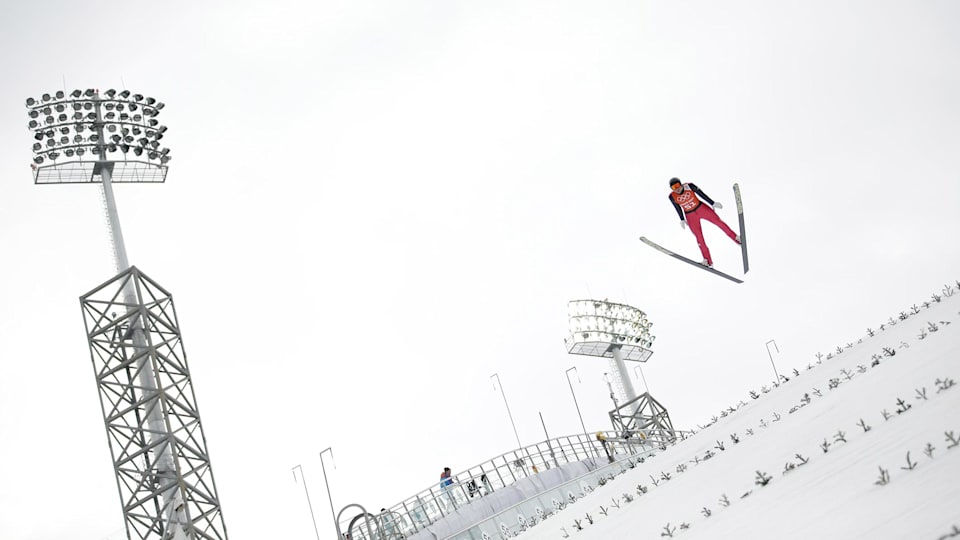Germany’s new superhero Rydzek eyes Nordic combined glory in PyeongChang
The 2016/17 Nordic combined season belonged to Johannes Rydzek. Victorious in both PyeongChang 2018 test events, he completed an unprecedented “grand slam” at the FIS Nordic World Ski Championships, winning all four available golds. If he maintains his stellar form, the young German has every chance of being one of the stars of the Olympic Winter Games 2018.

Germany will have high hopes of success in the Nordic combined events at PyeongChang 2018, with two true stars of the discipline set to take centre stage: reigning Olympic individual normal hill/10km champion Eric Frenzel – winner of a fifth consecutive FIS World Cup overall title in 2017 – and Rydzek, the rising star of the international scene.
Top of the leaderboard with just three events left, Rydzek ended up finishing second to his older compatriot in the World Cup standings. However, in February 2017, he upstaged Frenzel at the PyeongChang 2018 Olympic test events in Alpensia, and swept the board with four golds at the Nordic World Ski Championships in Lahti (FIN) a few weeks later.
Rydzek’s unprecedented grand slam had the German press dubbing him “the New Superman of the Nordic Combined”. And he lived up to that nickname with a daring and unconventional record attempt on Oberstdorf’s ski-flying hill on 25 September 2017. Swapping his skis for a pair of running shoes and travelling up the hill rather than down, he ran the fastest ever 50-metre sprint on an inclined gradient, covering the distance in just 27.67 seconds and earning himself a place in the Guinness World Records.
Early starter
“If you are born in Oberstdorf, you probably get your winter sport gene automatically,” says Rydzek of his home town in Bavaria. Famed for its ski jumping facilities, the resort hosts the annual Four Hills Tournament and has twice staged the Nordic World Ski Championships.
I used to go cross-country skiing with my parents,” adds the German. “My father was a volunteer at the Four Hills Tournament, which was also the reason why I’ve always wanted to jump.”
Attracted to both disciplines, Rydzek eventually found himself drawn to Nordic combined. He took part in his first FIS competitions at the age of 13 in 2005, and made his World Cup debut two years later. A month after being crowned world junior champion in Hinterzarten (GER) in January 2010, he made his Olympic debut in Vancouver and finished on the podium, helping the German quartet win bronze in the team large hill/4x5km. All this by the time he was 18.
He traded up to a silver in the same event at Sochi 2014, as the German quartet just missed out on gold in a sprint finish with Norway.
The 2014/15 season then brought further success as Rydzek won medals in all four events at the World Championships in Falun (SWE), including the first two golds of his career: in the individual normal hill/10km, where he finished ahead of Italy’s Alessando Pittin and France’s Jason Lamy-Chappuis; and the team normal hill/4x5km, alongside Edelmann, Frenzel and Riessle. He added a bronze in the large hill/10km and silver in the team sprint with Frenzel.
PyeongChang double and a Lahti grand slam
After a quiet 2015/16 season, Rydzek made a spectacular return to form the following year, registering eight World Cup victories, including two at the pre-Olympic test event in PyeongChang. “It’s good to be here,” he said, after his double in the Republic of Korea. “I did really well on the hill and in the cross-country. I’m delighted.”
Rydzek then stepped up a level with his record-breaking performance at the 2017 World Championships, where he began his clean sweep by successfully defending his individual normal hill/10km title, making up a 14.9-second deficit on Frenzel to coast to the line, German flag in hand.
Two days later he retained his second title, anchoring the German quartet, which also included Frenzel, Kircheisen and Riessle, to a 41.7 second victory over Norway in the team normal hill/4x5km.
In the individual large hill/10km, Rydzek had a challenge on his hands heading into the cross-country. Lying fifth at the halfway stage, he needed to make up over a minute on the leader, Austria’s Mario Seidl, who had out-jumped him by a clear 10 metres.
“I didn’t have a great jump and was doubting my chances in the cross-country,” he said after the race. “I managed to make up ground on the leaders, though, and I just tried to sit in and make sure the chasing group didn’t close up. I waited until the last lap to attack because I knew the finishing straight was long.”
The tactics worked to perfection. After breaking clear in the final kilometre, he won by 4.8 seconds ahead of Japan’s Akito Watabe, with François Braud of France taking bronze.
Partnering Frenzel in the team sprint, the final competition of the championships, Rydzek overtook Norway’s Magnus Krog on the final corner and won an unprecedented clean sweep, something nobody had managed when there were just three events up for grabs instead of four.
Though Frenzel went on to pip him to the World Cup title by 125 points, Rydzek was named FIS Athlete of the Year, while his stunning Lahti quadruple was voted Moment of the Year.
Rydzek will head to PyeongChang alongside Frenzel, Riessle and Kircheisen in what looks like Germany’s strongest ever Nordic combined team, and will surely fancy his prospects of adding Olympic individual and team gold to his medal collection.
